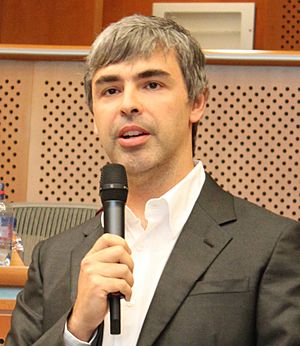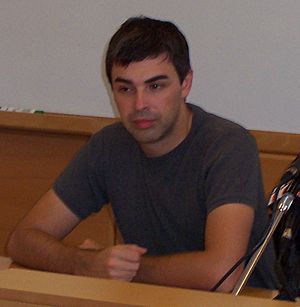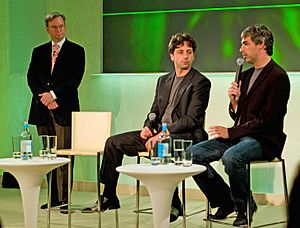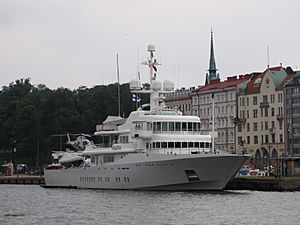Larry Page facts for kids
Quick facts for kids
Larry Page
|
|
|---|---|

Page in 2009
|
|
| Born |
Lawrence Edward Page
March 26, 1973 Lansing, Michigan, U.S.
|
| Education | |
| Occupation |
|
| Organization | |
| Known for |
|
| Spouse(s) |
Lucinda Southworth
(m. 2007) |
| Children | 2 |
| Relatives | Carrie Southworth (sister-in-law) |
| Signature | |
Lawrence Edward Page (born March 26, 1973) is an American computer scientist and businessperson. He is famous for creating the Google search engine with his friend Sergey Brin. Page is one of the richest people in the world.
Page was the first chief executive officer (CEO) of Google from 1997 to 2001. He became CEO again from 2011 to 2015. After that, he became the CEO of Google's new parent company, Alphabet Inc. He stepped down from this role in 2019 but still helps guide the company.
Page also helped create PageRank, the algorithm that made Google's search results so useful. An algorithm is a set of rules a computer follows to solve a problem.
Contents
A Childhood Full of Technology
Larry Page was born on March 26, 1973, in Lansing, Michigan. Both of his parents were experts in computer science. His father, Carl Page, was a professor and a pioneer in artificial intelligence. His mother, Gloria, taught computer programming.
Their home was filled with computers and science magazines. This environment encouraged Page to be creative and inventive from a young age. He loved to read and learn how things worked. When he was only six years old, he started playing with a personal computer his father brought home.
Page was the first kid in his elementary school to turn in an assignment typed on a word processor. He also loved taking things apart to see how they worked. By the time he was 12, he knew he wanted to start his own company someday.
Besides technology, Page also studied music. He played the saxophone and learned about music composition. He said that music taught him about timing, which inspired him to make Google work very fast.
Education and Early Inventions
Page went to a Montessori school, which is known for encouraging independence and creativity. He graduated from East Lansing High School in 1991.
He earned a degree in computer engineering from the University of Michigan. While there, he did some amazing projects. He once built a working inkjet printer out of Lego bricks. He also suggested that his university should use a driverless monorail system instead of buses.
After Michigan, Page went to Stanford University for his graduate studies in computer science. It was at Stanford that he would come up with the idea that changed the internet forever.
The Big Idea for Google
A New Way to Search the Web
At Stanford, Page needed a topic for his PhD research. He decided to study the World Wide Web. He was interested in how web pages link to each other. He thought of the web as a giant graph with billions of connections.
His idea was to figure out which web pages linked to any given page. He believed that the number and importance of these links could show how valuable a page was. This was a new way of thinking. At the time, search engines mostly just looked for keywords on a page.
A fellow Stanford student, Sergey Brin, became interested in Page's project. They started working together on a research project they nicknamed "BackRub."
Creating the PageRank Algorithm
To make their idea work, Page and Brin created a special formula called the PageRank algorithm. It was named after Larry Page. PageRank worked by counting the number and quality of links to a page to determine how important it was.
Think of it like a popularity contest. If a very important website (like a major news site) links to your page, it's like a very important person voting for you. This "vote" is worth more than a link from a small, unknown website. This system helped deliver much better search results than other search engines.
They turned Page's dorm room into a computer lab and Brin's room into an office. They used cheap, spare computer parts to build a system powerful enough to test their new search engine on the web. Soon, their project became so popular among Stanford students that it started to cause problems for the university's computer network.
The Birth of Google
From a Garage to a Global Company
In 1998, Page and Brin decided to start their own company. They needed a name and chose "Google," which is a play on the word "Googol". A googol is the number 1 followed by 100 zeros. This name represented their mission to organize the huge amount of information on the web.
They started their company in a friend's garage in Menlo Park, California. With a $100,000 investment from Andy Bechtolsheim, the co-founder of Sun Microsystems, they were able to get started. Page became the first CEO of Google.
Their mission was "to organize the world's information and make it universally accessible and useful." By 2000, Google had moved into its own office and had indexed one billion web pages, making it the biggest search engine on the web.
Leading Google's Growth
As CEO, Page wanted Google to move fast. He believed that the faster the search engine gave answers, the more people would use it. He pushed his engineers to make every search happen in a fraction of a second. This is also why Google's homepage has always had a simple design—so it loads quickly.
In 2001, Page and Brin hired Eric Schmidt, a more experienced executive, to be the CEO. Page then focused on Google's products. During this time, Page led the purchase of a small company called Android in 2005. He believed that mobile phones were the future. Today, Android is the most popular mobile operating system in the world.
A New Chapter as CEO
Returning to Lead Google
In 2011, Larry Page became the CEO of Google again. His main goal was to make the company's many teams work together more closely. He also encouraged his employees to work on "moonshots"—ambitious projects that could change the world, even if they seemed a bit crazy.
Under his leadership, Google launched many new products and improved existing ones. He led the creation of Google+, a social network, and the Chromebook, a new type of laptop. He also oversaw the purchase of Motorola Mobility to help protect the Android system.
Creating Alphabet Inc.
In 2015, Page announced a major change. Google would be reorganized under a new parent company called Alphabet Inc. Page became the CEO of Alphabet, and Sundar Pichai became the new CEO of Google.
This change allowed Google to focus on its main internet products, like search and advertising. Meanwhile, other companies under the Alphabet umbrella could work on different projects, such as self-driving cars (Waymo) and health research (Calico).
Page explained that the name Alphabet was chosen because it represents language, a key part of Google's search index. It also represents "alpha-bet," which means an investment that performs better than expected.
On December 3, 2019, Page and Brin announced that they were stepping down from their roles at Alphabet. Sundar Pichai became the CEO of both Google and Alphabet. Page and Brin remain on the board and continue to be major shareholders.
Other Interests and Personal Life
Page is an investor in companies that work on new technologies. He supported Tesla Motors. He is also interested in renewable energy and companies that are developing flying cars.
In 2007, Page married Lucinda Southworth, a research scientist. They have two children.
Page owns a superyacht called Senses and has built a large, environmentally friendly home in Palo Alto, California. The house uses solar panels, recycled materials, and a roof garden.
In 2013, Page shared that he has a health condition that affects his vocal cords, making his voice softer. He has donated money to support research on this condition.
Awards and Achievements
Larry Page has received many awards for his work with Google:
- In 1998, PC Magazine named Google one of the Top 100 Web Sites.
- In 2002, he was named a Global Leader for Tomorrow by the World Economic Forum.
- In 2003, he and Sergey Brin received an honorary MBA degree for their entrepreneurial spirit.
- In 2004, they received the Marconi Foundation's prize for their invention that changed how information is found.
- In 2005, they were chosen as Fellows of the American Academy of Arts and Sciences.
- In 2008, Google received the Communication Award from Prince Felipe at the Prince of Asturias Awards.
- In 2009, Larry received an honorary doctorate from the University of Michigan.
- In 2014, Fortune magazine named Larry Page its "Businessperson of the Year."
- In 2015, he was ranked number one on Forbes' "America's Most Popular Chief Executives" list, based on votes from Google employees.
- In 2017, he was given honorary citizenship of Agrigento, Italy.
Larry Page quotes
- "You need to get one thing done well, or else you don't have permission to do anything else."
- "Almost everyone who has had an idea that's somewhat revolutionary or wildly successful was first told they're insane."
- "It's very hard to fail completely, if you aim high enough."
- "If you’re not doing some things that are crazy, then you’re doing the wrong things."
- "Lots of companies don't succeed over time. What do they fundamentally do wrong? They usually miss the future."
- "Always deliver more than expected."
- "Optimism is important. You have to be a little silly about the goals you are going to set. There is a phrase I learned in college called, 'having a healthy disregard for the impossible.' That is a really good phrase. You should try to do things that most people would not do."
- "It is often easier to make progress on mega-ambitious dreams. ... Since no one else is crazy enough to do it, you have little competition."
Interesting facts about Larry Page
- Larry's parents divorced when he was eight years old, but he maintained a good relationship with both of them.
- He has an older brother Carl Victor Page Jr.
- When acquiring products and companies for Google, Page asked whether the business acquisition passed the toothbrush test, asking the question "Is it something you will use once or twice a day, and does it make your life better?".
- In the early 2000s, Page briefly dated Marissa Mayer, American business leader and former CEO of Yahoo!, who was a Google employee at that time.
- Page has purchased multiple private islands across the Caribbean and South Pacific, including the Hans Lollik Island in 2014, Eustatia Island, Cayo Norte in 2018, and Tavarua in 2020.
See also
 In Spanish: Larry Page para niños
In Spanish: Larry Page para niños
 | William M. Jackson |
 | Juan E. Gilbert |
 | Neil deGrasse Tyson |





